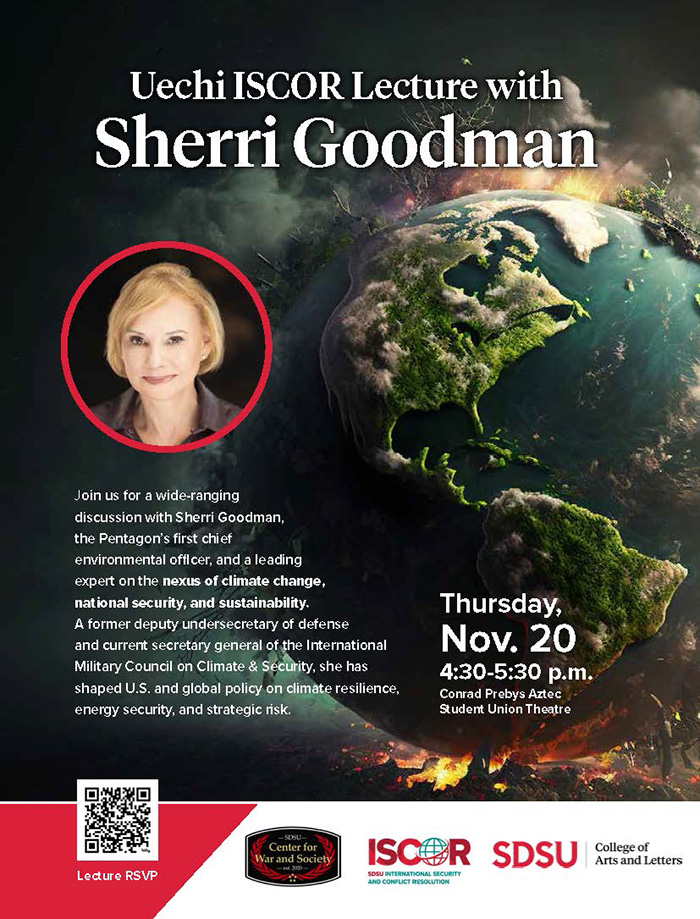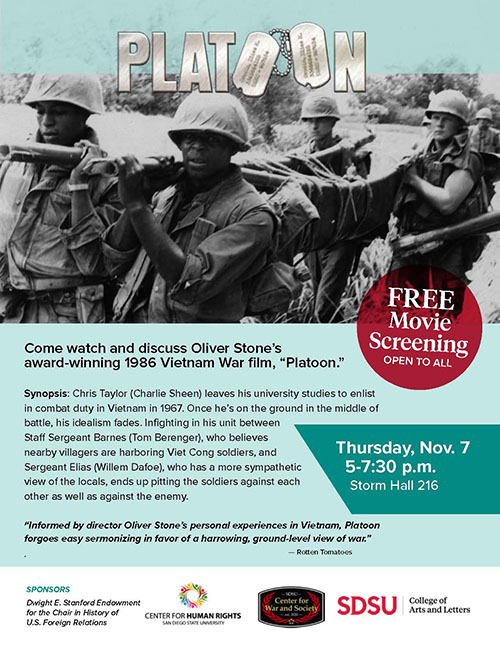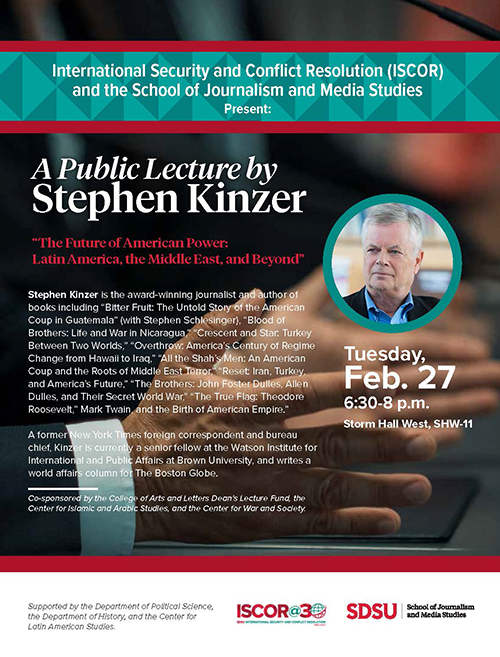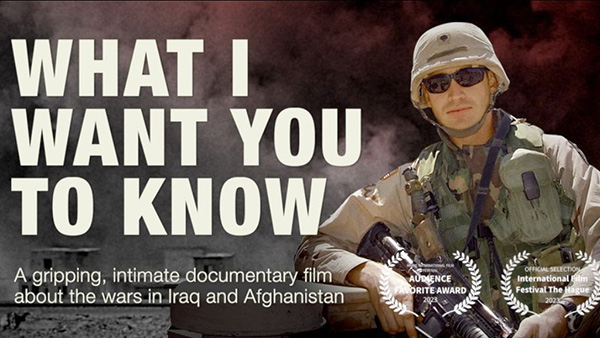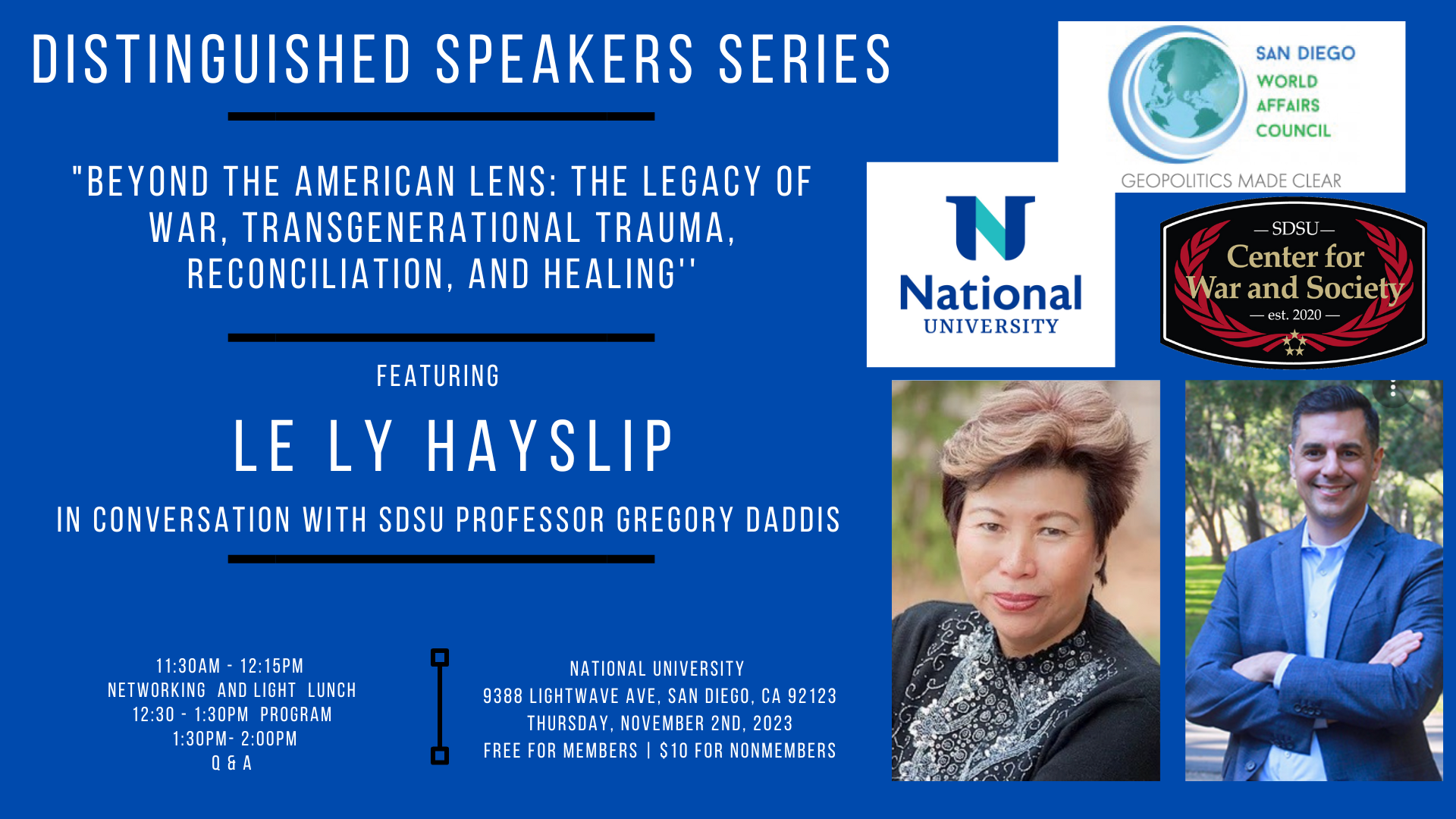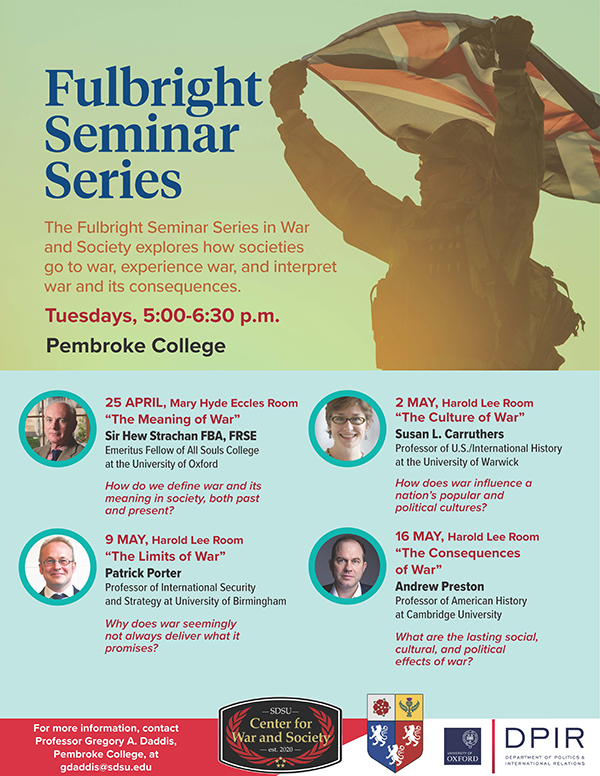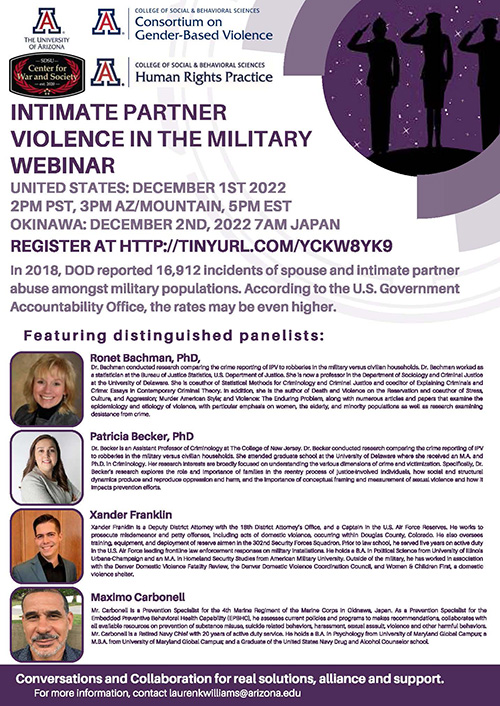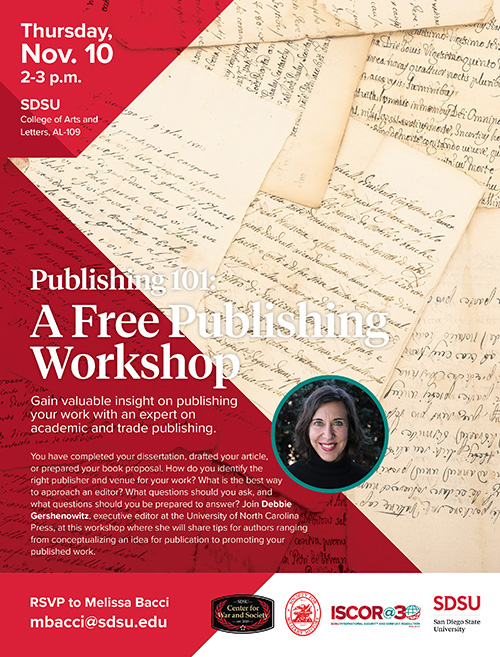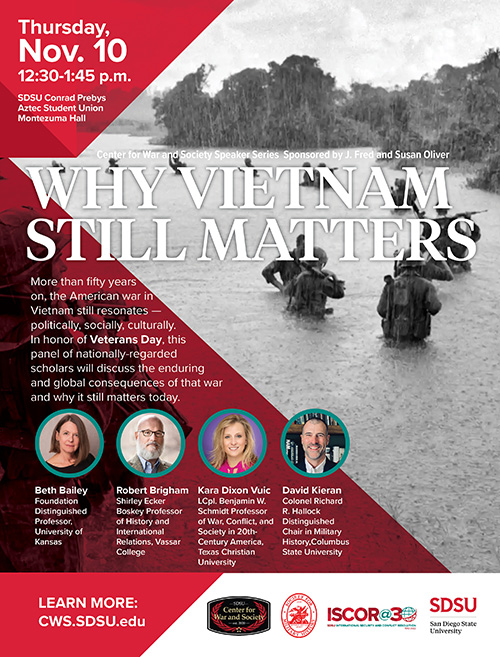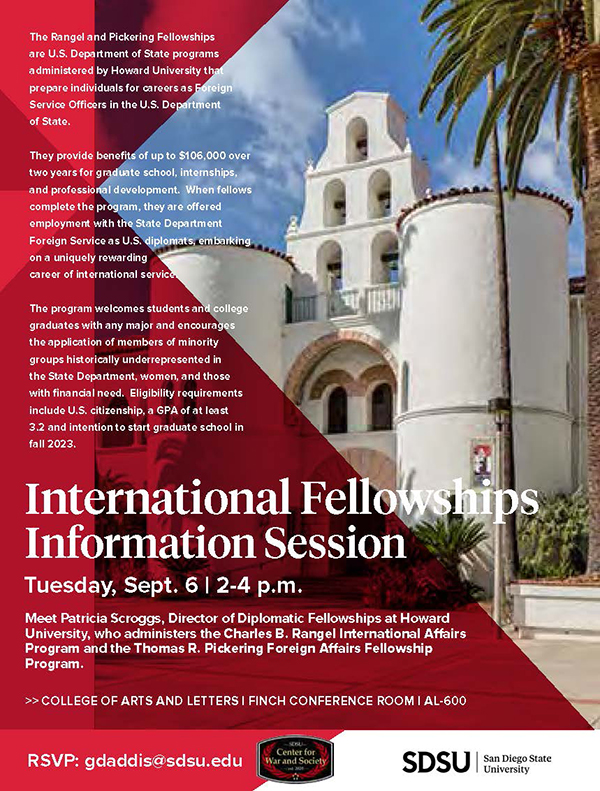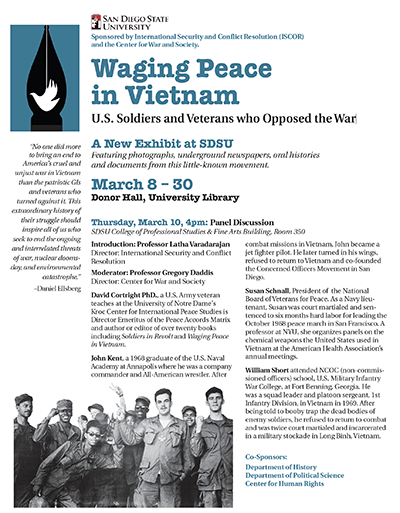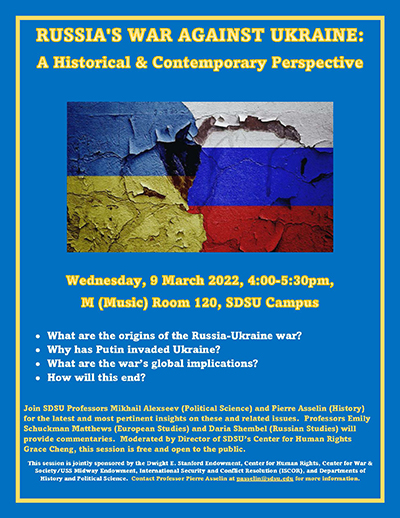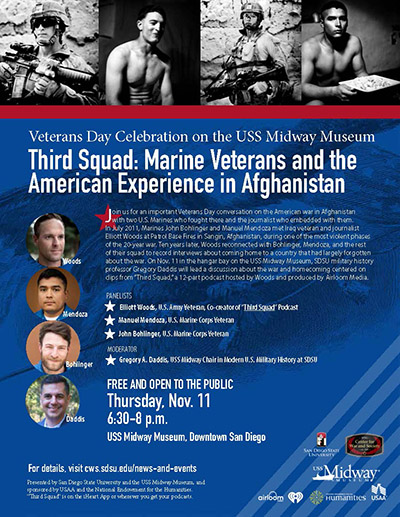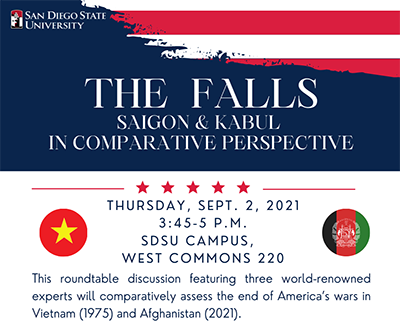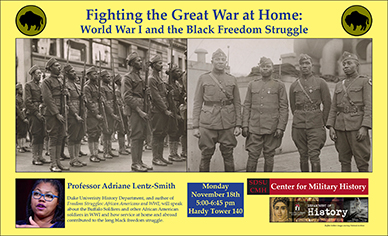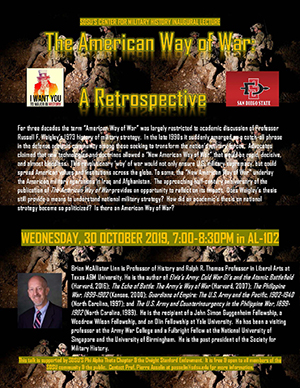
News and Events
Current Events
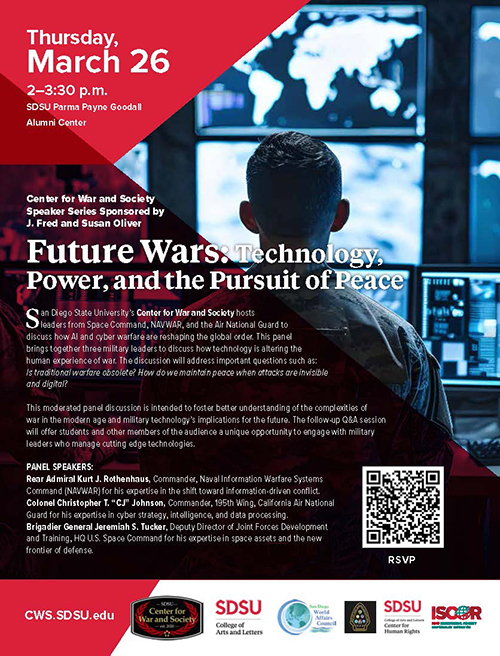
Future Wars: Technology, Power, and the Pursuit of Peace
J. Fred and Susan Oliver Speaker Series – Panel Discussion
Thursday, March 26, 2026
2–3:30 p.m.
SDSU Parma Payne Goodall Alumni Center
San Diego State University’s Center for War and Society hosts leaders from Space Command, NAVWAR, and the Air National Guard to discuss how AI and cyber warfare are reshaping the global order. This panel brings together three military leaders to discuss how technology is altering the human experience of war. The discussion will address important questions such as: Is traditional warfare obsolete? How do we maintain peace when attacks are invisible and digital?
This moderated panel discussion is intended to foster better understanding of the complexities of war in the modern age and military technology’s implications for the future. The follow-up Q&A session will offer students and other members of the audience a unique opportunity to engage with military leaders who manage cutting edge technologies.
Panel Speakers:
- Rear Admiral Kurt J. Rothenhaus, Commander, Naval Information Warfare Systems Command (NAVWAR) for his expertise in the shift toward information-driven conflict.
- Colonel Christopher T. “CJ” Johnson, Commander, 195th Wing, California Air National Guard for his expertise in cyber strategy, intelligence, and data processing.
- Brigadier General Jeremiah S. Tucker, Deputy Director of Joint Forces Development and Training, HQ U.S. Space Command for his expertise in space assets and the new frontier of defense.
Sponsored by the Center for War and Society, the College of Arts and Letters, the San Diego World Affairs Council, the Center for Human Rights, and the International Security and Conflict Resolution program.

Making War Humane: Past, Present, and Future
J. Fred and Susan Oliver Speaker Series - Lecture
Thursday, March 26, 2026
5:30 p.m. Lecture
SDSU Parma Payne Goodall Alumni Center
We are honored to welcome Samuel Moyn, the Kent Professor of Law and History at Yale University, for an examination of the ethical paradoxes within modern conflicts. Drawing on his acclaimed work “Humane: How the United States Abandoned Peace and Reinvented War,” Professor Moyn will address the unsettling possibility that our efforts to humanize war have inadvertently shored up the military enterprise, making it more durable and pervasive in the modern era.
From the inception of humanitarian goals to the contemporary realities of the Global War on Terror and the Israel-Gaza conflict, Moyn applies the same rigorous intellectual history found in his celebrated volumes, such as “The Last Utopia” and “Liberalism Against Itself,” to challenge our fundamental assumptions about peace and justice.
As a prolific scholar and the head of Yale’s Grace Hopper College, Moyn continues to redefine the intersection of law, history, and power, offering our community a timely and sophisticated perspective on the future of global ethics.
Sponsored by the Center for War and Society, the College of Arts and Letters, the San Diego World Affairs Council, the San Diego Army ROTC, the Center for Human Rights, and the International Security and Conflict Resolution program.
Uechi ISCOR Lecture with Sherri Goodman
Thursday, Nov. 20, 4:30-5:30 p.m. in Conrad Prebys Aztec, Student Union Theatre
Join us for a wide-ranging discussion with Sherri Goodman, the Pentagon’s first chief environmental officer, and a leading expert on the nexus of climate change, national security, and sustainability. A former deputy undersecretary of defense and current secretary general of the International Military Council on Climate & Security, she has shaped U.S. and global policy on climate resilience, energy security, and strategic risk.
About Sherri Goodman
First Ever Pentagon Chief Environmental Officer, Sustainability & National Security Expert & Author
A pioneer in sustainability and national security, Sherri Goodman is among the most respected international voices on emerging global risks, including energy and climate security, environment and public health. The Pentagon’s first-ever Deputy Undersecretary of Defense (Environmental Security), Sherri led efforts to transform the Department of Defense into a leader in sustainability, climate resilience and advanced energy. Her book, Threat Multiplier: Climate, Military Leadership and the Fight for Global Security, gives readers an inside account, from the Pentagon to the battlefield, of today’s military on the front lines of a changing climate, the energy transition, technology upheavals and new health challenges.
Sherri is recognized for her ability to blend a compelling strategic vision with operational execution to strengthen national security and mission readiness. An experienced “change agent” for large institutions, including the U.S. Department of Defense, Sherri has founded, led or advised over a dozen public and private sector organizations for sustainable success.
Using her famous coinage “threat multiplier,” Sherri is credited with educating a generation of U.S. military and government officials about the nexus between climate change and national security, fundamentally shaping the field of climate and energy security. As the founder and first Executive Director of the CNA Military Advisory Board on Climate Change and National Security, she led the first efforts to assess the national security implications of climate change as a strategic imperative. This work led to more than a decade of bipartisan action on building energy and climate resilience in defense missions and protecting troops from growing biological and other health risks to protect resilience and troop health.
Today, Sherri serves as the Secretary General of the International Military Council on Climate & Security, the leading international organization for national security and military leaders on climate and energy security and as a Senior Fellow at the Wilson Center. Sherri advises governments and private firms on sustainability, energy, climate and technology opportunities.
Recognized by both military and environmental officials for her leadership in national security, energy and sustainability, Sherri has twice received the Department of Defense Distinguished Service Award, the Environmental Protection Agency’s Climate Change Award, the Lifetime Achievement Award from the Environmental Peacebuilding Association, as well as an Honorary Doctorate from Amherst College.
A sought-after speaker for domestic and international audiences, Sherri has appeared on CNN, PBS NewsHour, BBC, NPR and other major media. She is equally comfortable with keynotes and fireside chat formats. She has testified before many congressional committees as a leading authority on sustainability, energy, and climate security. She has taught and delivered lectures at numerous universities and has appeared in several films, including The Age of Consequences, Journey to Planet Earth, Carbon Nation and From Paris to Pittsburgh. Sherri has degrees from Harvard Law School, Harvard Kennedy School and Amherst College, where she was co-founder of the Women’s Ski Team.
This event is presented by the International Security and Conflict Resolution (ISCOR) program at the College of Arts and Letters, through generous funding by donor and alumnus
Edward Uechi (ISCOR '05). Additional support is also provided by the Center for War
and Society.
"Can it Happen Here? The Threat of Genocide in the United States"
Wednesday, November 5, 2025
7-8:30 p.m.
at SDSU Parma Payne Goodall Alumni Center
In an era of rising political polarization and identity-driven conflict, how resistant is the United States to the threat of genocidal violence? What lessons can be drawn from societies that have experienced genocide—and how might deep-rooted cultural narratives around honor, rage, and revenge make even established democracies vulnerable?
Join the San Diego World Affairs Council (SDWAC) and the SDSU Centers for Human Rights and War and Society for a vital conversation with Professor Alexander Hinton, a leading expert on genocide, cultural violence, and white power movements in the United States. Hinton is a Distinguished Professor of Anthropology, Director of the Center for the Study of Genocide and Human Rights, and UNESCO Chair on Genocide Prevention at Rutgers University. His recent book, "It Can Happen Here: White Power and the Rising Threat of Genocide in the US," explores how seemingly stable societies can spiral into violence.
The discussion will be moderated by Grace Cheng, Founding Director of the Center for Human Rights at the College of Arts and Letters at San Diego State University.
This event confronts difficult but necessary questions about the fragility of democracy, the power of ideology, and the warning signs we must not ignore.
Free to the public
 “Militarizing Cold War Children”
“Militarizing Cold War Children”
with Kara Dixon Vuic, LCpl. Benjamin W. Schmidt Professor of War, Conflict, and Society in Twentieth-Century America at Texas Christian University
Thursday, February 13, 2025
12:30-1:45 p.m.
Gold Auditorium, Donald P. Shiley Bioscience Center
Free and Open to the Public
The beginning of the Cold War intensified discussions of citizenship and the role of citizens in American homes and schools. With all of American society expected to defend the nation against threats both internal and domestic, everyone had a part to play. Young girls and boys found their lives under great scrutiny, but also of profound national significance. We’ll consider how Americans raised Cold War warriors, in the home, in schools, and in the community. “Bert the Turtle”* was very alert, but so were parents, educators, and much of American institutions and culture.
*”Bert the Turtle” was created in 1952 by Raymond J. Mauer and Anthony Rizzo.
Sponsors: Center for War and Society and Center for Comics Studies
Free Movie Screening: Platoon
Thursday, November 7, 2024
5-7:30 p.m.
in Storm Hall 216
Open to All
Come watch and discuss Oliver Stone’s award-winning 1986 Vietnam War film, “Platoon.”
Synopsis: Chris Taylor (Charlie Sheen) leaves his university studies to enlist in combat duty in Vietnam in 1967. Once he’s on the ground in the middle of battle, his idealism fades. Infighting in his unit between Staff Sergeant Barnes (Tom Berenger), who believes nearby villagers are harboring Viet Cong soldiers, and Sergeant Elias (Willem Dafoe), who has a more sympathetic view of the locals, ends up pitting the soldiers against each other as well as against the enemy.
“Informed by director Oliver Stone’s personal experiences in Vietnam, Platoon forgoes
easy sermonizing in favor of a harrowing, ground-level view of war.”
— Rotten Tomatoes
Sponsors: Dwight E. Stanford Endowment for the Chair in History of U.S. Foreign Relations,
Center for Human Rights, Center for War and Society and College of Arts and Letters.
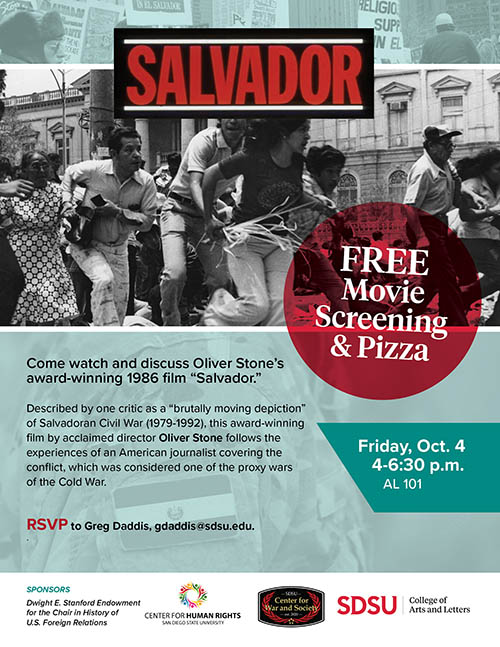 Free Movie Screening: Salvador and Pizza
Free Movie Screening: Salvador and Pizza
Friday, October 4, 2024
4-6:30 p.m.
in AL 101
Described by one critic as a “brutally moving depiction” of Salvadoran Civil War (1979-1992), this award-winning film by acclaimed director Oliver Stone follows the experiences of an American journalist covering the conflict, which was considered one of the proxy wars of the Cold War.
RSVP to Greg Daddis, [email protected].
Sponsors: Dwight E. Stanford Endowment for the Chair in History of U.S. Foreign Relations,
Center for Human Rights, Center for War and Society and College of Arts and Letters.
 Climbing Alternate Peaks: Reintegration After Traumatic Brain Injury
Climbing Alternate Peaks: Reintegration After Traumatic Brain Injury
Thursday, Oct. 17
6:30 p.m.
SDSU Parma Payne Goodall Alumni Center, Fowler Family Ballroom
How do athletes recover from traumatic brain injuries (TBI) after major accidents? How are military service members and veterans at risk of TBI during combat and training exercises? What can we all learn about quality of life and reintegration into society after trauma from these experiences
Join us for a wide-ranging discussion with nationally-renowned advocates, scholars, and athletes as we examine the consequences of TBI and the ways in which survivors deal with loss, recovery, and resilience.
Presenters include:
- Monica J. Casper, Dean, College of Arts and Sciences, Seattle University
- Jamie MoCrazy, MoCrazy Strong Foundation
- Grace Mauzy, MoCrazy Strong Foundation
- David Kieran, Colonel Richard R. Hallock Distinguished Chair in Military History, Columbus State University
Co-presented by: MoCrazy Strong Foundation, San Diego World Affairs Council, Seattle University College of Arts and Sciences, SDSU Center for War and Society, SDSU College of Arts and Letters, SDSU College of Health and Human Services, SDSU College of Professional Studies and Fine Arts
For additional details, contact Gregory A. Daddis at [email protected].
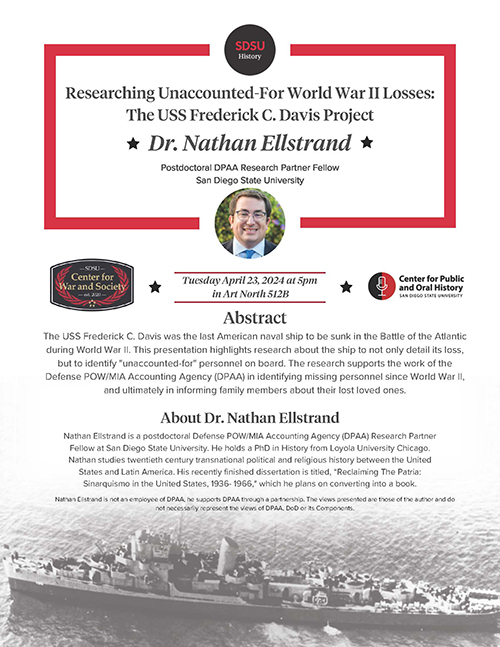 Researching Unaccounted-For World War II Losses: The USS Frederick C. Davis Project
Researching Unaccounted-For World War II Losses: The USS Frederick C. Davis Project
Tuesday April 23, 2024
5 p.m.
in Art North 512B
The USS Frederick C. Davis was the last American naval ship to be sunk in the Battle
of the Atlantic
during World War II. This presentation highlights research about the ship to not only
detail its loss,
but to identify "unaccounted-for" personnel on board. The research supports the work
of the
Defense POW/MIA Accounting Agency (DPAA) in identifying missing personnel since World
War II,
and ultimately in informing family members about their lost loved ones.
Nathan Ellstrand is a postdoctoral Defense POW/MIA Accounting Agency (DPAA) Research
Partner
Fellow at San Diego State University. He holds a PhD in History from Loyola University
Chicago.
Nathan studies twentieth century transnational political and religious history between
the United
States and Latin America. His recently finished dissertation is titled, “Reclaiming
The Patria:
Sinarquismo in the United States, 1936- 1966," which he plans on converting into a
book.
Nathan Ellstrand is not an employee of DPAA, he supports DPAA through a partnership.
The views presented are those of the author and do not necessarily represent the views
of DPAA, DoD or its Components.
Sponsored by the Center for War and Society and the Center for Public and Oral History.
The Future of American Power: Latin America, the Middle East, and Beyond
A Public Lecture by Stephen Kinzer
Tuesday, February 27, 2024
6:30-8 p.m.
Storm Hall West, SHW-11
Stephen Kinzer is the award-winning journalist and author of books including “Bitter Fruit: The Untold Story of the American Coup in Guatemala” (with Stephen Schlesinger), “Blood of Brothers: Life and War in Nicaragua,” “Crescent and Star: Turkey Between Two Worlds,” “Overthrow: America’s Century of Regime Change from Hawaii to Iraq,” “All the Shah’s Men: An American Coup and the Roots of Middle East Terror,” “Reset: Iran, Turkey, and America’s Future,” “The Brothers: John Foster Dulles, Allen Dulles, and Their Secret World War,” “The True Flag: Theodore Roosevelt,” Mark Twain, and the Birth of American Empire.”
A former New York Times foreign correspondent and bureau chief, Kinzer is currently a senior fellow at the Watson Institute for International and Public Affairs at Brown University, and writes a world affairs column for The Boston Globe.
Presented by International Security and Conflict Resolution (ISCOR) and the School of Journalism and Media Studies.
Co-sponsored by the College of Arts and Letters Dean’s Lecture Fund, the Center for Islamic and Arabic Studies, and the Center for War and Society.
Supported by the Department of Political Science, the Department of History, and the
Center for Latin American Studies.
New Scholarship to Benefit Students Studying War and Society, History, and Political Science
The Dr. Ora B. Gordon, MD and CAPT Lance B. Gordon, USN (Ret.) Endowed Scholarship for the Center of War and Society will support a wide range of SDSU students.
Lance Gordon graduated from SDSU with a B.A. in political science. He received a J.D. from the University of California, San Francisco, School of Law, and an LL.M in taxation from New York University, School of Law. He also received a Master of Strategic Studies degree from the U.S. Army War College.
Read the full story on CAL News.
Film Screening: "What I Want You to Know"
Tuesday, November 14, 2023
7-7:45 p.m. EST/ 4-4:45 p.m. PST
The documentary “What I Want You to Know” is a heartbroken love letter from 13 Iraq and Afghan veterans to the American public. With searing candor, they share stories from their deployments in Iraq and Afghanistan – and the moral injury that came from being asked to betray their sense of what is right, resulting in a sense of alienation upon return home and high levels of suicide. Their call to action is that we all be better citizens, and actually insist that our government not deploy citizen soldiers into unnecessary wars.
In honor of America’s current and past service members this Veterans Day, please join the Quincy Institute for a discussion about this important new film, featuring:
Capt. Tommy Furlong
Tommy Furlong is an Executive Producer of "What I Want You to Know" who served as
an Infantry Officer with 3rd Battalion 6th Marine Regiment from 2008-2011. He deployed
in 2010 to Afghanistan as a Rifle Platoon Commander, Weapons Platoon Commander and
Fire Support Team Leader.
Catie Foertsch
Catie Foertsch is the Director and a Producer of "What I Want You to Know." A former
journalist and veteran commercial filmmaker who lives in greater Boston, this is her
first feature-length documentary film.
Gregory Daddis
Gregory A. Daddis is director of the Center of War and Society at San Diego State
University, where he holds the USS Midway Chair in Modern U.S. Military History. He
served 26 years in the U.S. Army before entering academia.
View the trailer of the documentary on the Quincy Institute website. The full-length documentary will be available to view online for free following the panel discussion.
 Why Iraq Still Matters
Why Iraq Still Matters
Thursday, November 9, 2023
12:30 - 1:45 p.m.
SDSU Conrad Prebys Aztec Student Union
It has been twenty years since the American invasion and occupation of Iraq. To mark this year’s Veterans Day, join us for a conversation with nationally-regarded scholars, and a veteran on the enduring and global consequences of that war and why it still matters today.
Featuring:
Zainab Saleh
Associate Professor of Anthropology, Haverford College
Steven Simon
Professor of Practice in Middle East Studies, University of Washington
Frank Sobchak
Chair of Irregular Warfare Studies, Modern Warfare Institute, West Point
Sponsored by J. Fred and Susan Oliver
Distinguished Speaker Series: Beyond the American Lens: The Legacy of War, Transgenerational Trauma, Reconciliation, and Healing
Thursday, November 2, 2023
11:30 a.m. - 2:00 p.m.
National University (9388 Lightwave Ave, San Diego, CA 92123)
Featuring: Le Ly Hayslip in coversation with SDSU Professor Gregory Daddis
San Diego World Affairs Council is pleased to partner with National University to engage the public on this timely topic, as it coincides with the 50th anniversary of the U.S. withdrawal from Vietnam. This program will be structured as a guided conversation between Daddis and Hayslip, including ample time for participant questions and answers.
Cost: Free for San Diego World Affairs Council Members | $10 for Nonmembers
Professor of History Receives Fulbright Distinguished Scholar Award
Gregory Daddis will teach, lecture and conduct research at Pembroke College, Oxford
Gregory Daddis, history professor, director of the Center for War and Society, and USS Midway Chair in Modern U.S. Military History, understands America’s relationship to war. He served more than 25 years in the U.S. Army before entering academia.
A leading scholar on the Cold War, Vietnam, and U.S. foreign policy, he has written numerous books, essays, and articles, and currently teaches on the relationships between war and society at San Diego State University.
Read the full story on SDSU NewsCenter.
Gregory A. Daddis featured in C-SPAN2's American History TV "Lectures in History" Series
Daddis presented a lecture titled “The Red Scare at Home and Abroad” for his fall course Comics and Cold War America (HIST-580) on American History TV.
The Center for Comics Studies was highlighted.
National Edward R. Murrow Award
Gregory A. Daddis' NEH grant-funded "Third Squad: After Afghanistan" podcast won the RTDNA 2022 National Edward R. Murrow Award for a Podcast in Small Digital News Organization.
View the full list of awardees at RTDNA Edward R. Murrow Awards 2022.
Fulbright Seminar Series
The Fulbright Seminar Series in War and Society explores how societies go to war, experience war, and interpret war and its consequences.
Tuesdays, 5:00-6:30 p.m. at Pembroke College
“The Meaning of War”
25 April | Location: Mary Hyde Eccles Room
How do we define war and its meaning in society, both past and present?
Sir Hew Strachan FBA, FRSE
Emeritus Fellow of All Souls College at the University of Oxford
“The Culture of War”
2 May | Location: Harold Lee Room
How does war influence a nation’s popular and political cultures?
Susan L. Carruthers
Professor of U.S./International History at the University of Warwick
“The Limits of War”
9 May | Location: Harold Lee Room
Why does war seemingly not always deliver what it promises?
Patrick Porter
Professor of International Security and Strategy at the University of Birmingham
“The Consequences of War”
16 May | Location: Harold Lee Room
What are the lasting social, cultural, and political effects of war?
Andrew Preston
Professor of American History at Cambridge University
For more information, contact Professor Gregory A. Daddis, Pembroke College, at [email protected].
Discussion and Book Signing
Meet international bestselling author Nguyễn Phan Quế Mai as she presents her new novel, Dust Child. Vietnamese actress and audiobook narrator Quyên Ngô will also perform.
Tuesday, March 21 | 6 p.m.
Location: Point Loma Assembly (3035 Talbot Street, San Diego, CA 92106)
Register for this sepcial event.
Dust Child is “a suspenseful and moving saga about family secrets, hidden trauma, and the overriding power of forgiveness, set during the war and in present-day Việt Nam.”
Sponsored by La Playa Books and the Center for War and Society
Intimate Partner Violence in the Military Webinar
United States: December 1, 2022 2pm PST, 3pm AZ/Mountain, 5pm EST
Okinawa: December 2, 2022 7am Japan
Register for the Zoom link.
In 2018, DOD reported 16,912 incidents of spouse and intimate partner abuse amongst military populations. According to the U.S. Government Accountability Office, the rates may be even higher.
Featuring distinguished panelists:
Ronet Bachman, Ph.D.
Dr. Bachman conducted research comparing the crime reporting of IPV to robberies in
the military versus civilian households. Dr. Bachman worked as a statistician at the
Bureau of Justice Statistics, U.S. Department of Justice. She is now a professor in
the Department of Sociology and Criminal Justice at the University of Delaware. She
is coauthor of Statistical Methods for Criminology and Criminal Justice and coeditor
of Explaining Criminals and Crime: Essays in Contemporary Criminal Theory. In addition,
she is the author of Death and Violence on the Reservation and coauthor of Stress,
Culture, and Aggression; Murder American Style; and Violence: The Enduring Problem,
along with numerous articles and papers that examine the epidemiology and etiology
of violence, with particular emphasis on women, the elderly, and minority populations
as well as research examining desistance from crime.
Patricia Becker, Ph.D.
Dr. Becker is an Assistant Professor of Criminology at The College of New Jersey.
Dr. Becker conducted research comparing the crime reporting of IPV to robberies in
the military versus civilian households. She attended graduate school at the University
of Delaware where she received an M.A. and Ph.D. in Criminology, Her research interests
are broadly focused on understanding the various dimensions of crime and victimization.
Specifically, Dr, Becker's research explores the role and importance of families in
the reentry process of justice-involved individuals, how social and structural dynamics
produce and reproduce oppression and harm, and the importance of conceptual framing
and measurement of sexual violence and how it impacts prevention efforts.
Xander Franklin
Xander Franklin is a Deputy District Attorney with the 18th District Attorney's Office,
and a Captain in the U.S. Air Force Reserves. He works to prosecute misdemeanor and
petty offenses, including acts of domestic violence, occurring within Douglas County,
Colorado. He also oversees training, equipment, and deployment of reserve airmen in
the 302nd Security Forces Squadron. Prior to law school he served five years on active
duty in the U.S. Air Force leading frontline law enforcement responses on military
installations. He holds a B.A. in Political Science from University of Illinois Urbana-Champaign
and an M.A. in Homeland Security Studies from American Military University. Outside
of the military, he has worked in association with the Denver Domestic Violence Fatality
Review, the Denver Domestic Violence Coordination Council, and Women & Children First,
a domestic violence shelter.
Maximo Carbonell
Mr. Carbonell is a Prevention Specialist for the 4th Marine Regiment of the Marine
Corps in Okinawa, Japan. As a Prevention Specialist for the Embedded Preventive Behavioral
Health Capability (EPBHC), he assesses current policies and programs to makes recommendations,
collaborates with all available resources on prevention of substance misuse, suicide
related behaviors, harassment, sexual assault, violence and other harmful behaviors.
Mr. Carbonell is a Retired Navy Chief with 20 years of active duty service. He holds
a B.A. in Psychology from University of Maryland Global Campus; a M.B.A. from University
of Maryland Global Campus; and a Graduate of the United States Navy Drug and Alcohol
Counselor school.
Conversations and Collaboration for real solutions, alliance and support.
For more information, contact [email protected].
Publishing 101: A Free Publishing Workshop
Thursday, Nov. 10 | 2-3 p.m. | AL-109
Gain valuable insight on publishing your work with an expert on academic and trade publishing.
You have completed your dissertation, drafted your article, or prepared your book proposal. How do you identify the right publisher and venue for your work? What is the best way to approach an editor? What questions should you ask, and what questions should you be prepared to answer?
Join Debbie Gershenowitz, executive editor at the University of North Carolina Press, at this workshop where she will share tips for authors ranging from conceptualizing an idea for publication to promoting your published work.
RSVP to Melissa Bacci [email protected].
Why Vietnam Still Matters
Thursday, Nov. 10 | 12:30-1:45 p.m. | SDSU Conrad Prebys, Aztec Student Union
More than fifty years on, the American war in Vietnam still resonates — politically, socially, culturally. In honor of Veterans Day, this panel of nationally-regarded scholars will discuss the enduring and global consequences of that war and why it still matters today.
Featuring:
- Beth Bailey, Foundation Distinguished Professor, University of Kansas Texas Christian University
- Robert Brigham, Shirley Ecker Boskey Professor of History and International Relations, Vassar
- Kara Dixon Vuic, LCpl. Benjamin W. Schmidt Professor of War, Conflict, and Society in 20th- Century America, Texas Christian University
- David Kieran, Colonel Richard R. Hallock Distinguished Chair in Military History, Columbus State University
Sponsored by J. Fred and Susan Oliver
International Fellowships Information Session
Tuesday, Sept. 6 | 2-4 p.m. | Finch Conference Room, AL-600
RSVP: [email protected]
Meet Patricia Scroggs, Director of Diplomatic Fellowships at Howard University, who administers the Charles B. Rangel International Affairs Program and the Thomas R. Pickering Foreign Affairs Fellowship Program.
About the Fellowship
The Rangel and Pickering Fellowships are U.S. Department of State programs administered by Howard University that prepare individuals for careers as Foreign Service Officers in the U.S. Department of State.
They provide benefits of up to $106,000 over two years for graduate school, internships, and professional development. When fellows complete the program, they are offered employment with the State Department Foreign Service as U.S. diplomats, embarking on a uniquely rewarding career of international service.
The program welcomes students and college graduates with any major and encourages the application of members of minority groups historically underrepresented in the State Department, women, and those with financial need. Eligibility requirements include U.S. citizenship, a GPA of at least 3.2 and intention to start graduate school in fall 2023.
Waging Peace in Vietnam: U.S. Soldiers and Veterans who Opposed the War
A National Endowment for the Humanities “Dialogues of War” Workshop Series
A New Exhibit at SDSU
March 8-30
Donor Hall, University Library
Featuring photographs, underground newspapers, oral histories and documents from this little-known movement.
Panel Discussion
Thursday, March 10, 4 pm
Professional Studies & Fine Arts (PSFA) Building, Room 350
Introduction: Professor Latha Varadarajan
Director: International Security and Conflict Resolution
Moderator: Professor Gregory Daddis
Director: Center for War and Society
David Cortright Ph.D., a U.S. Army veteran teaches at the University of Notre Dame's Kroc Center for International Peace Studies is Director Emeritus of the Peace Accords Matrix and author or editor of over twenty books including Soldiers in Revolt and Waging Peace in Vietnam.
John Kent, a 1968 graduate of the U.S. Naval Academy at Annapolis where he was a company commander and All-American wrestler. After combat missions in Vietnam, John became a jet fighter pilot. He later turned in his wings, refused to return to Vietnam and co-founded the Concerned Officers Movement in San Diego.
Susan Schnall, President of the National Board of Veterans for Peace. As a Navy lieutenant, Susan was court martialed and sentenced to six months hard labor for leading the October 1968 peace march in San Francisco. A professor at NYU, she organizes panels on the chemical weapons the United States used in Vietnam at the American Health Association’s annual meetings.
William Short attended NCOC (non-commissioned officers) school, U.S. Military Infantry War College, at Fort Benning, Georgia. He was a squad leader and platoon sergeant, 1st Infantry Division, in Vietnam in 1969. After being told to booby trap the dead bodies of enemy soldiers, he refused to return to combat and was twice court martialed and incarcerated in a military stockade in Long Binh, Vietnam.
Sponsored by International Security and Conflict Resolution (ISCOR), Center for War and Society, Department of History, Department of Political Science, and Center for Human Rights.
Russia's War Against Ukraine: A Historical and Contemporary Perspective
Wednesday, 9 March 2022, 4-5:30pm
Music, Room 120, SDSU Campus
Free and open to the public.
- What are the origins of the Russia-Ukraine war?
- Why has Putin invaded Ukraine?
- What is the war’s global implications?
- How will this end?
Join SDSU Professors Mikhail Alexseev (Political Science) and Pierre Asselin (History) for the latest and most pertinent insights on these and related issues. Professors Emily Schuckman Matthews (European Studies) and Daria Shembel (Russian Studies) will provide commentaries. Moderated by Director of SDSU’s Center for Human Rights Grace Cheng.
Sponsored by the Dwight E. Stanford Endowment, Center for Human Rights, Center for War & Society/USS Midway Endowment, International Security and Conflict Resolution (ISCOR), and Departments of History and Political Science.
Contact Professor Pierre Asselin at [email protected] for more information.
New Documentary Podcast Debuts in Fall 2021
Learn about the wartime and homecoming experiences of a group of United States Marines who served during the most violent phase of the Afghanistan War. “Third Squad” is a new 10-episode documentary podcast series produced by Airloom Media and Elliott Woods for iHeart Media with the support of the Center for War and Society. Episodes will be available on all major streaming platforms starting in late 2021.
A link to the podcast will be made available here.
Save the date for a public launch event for “Third Squad” on Veterans Day, Nov. 11, at the USS Midway in San Diego. Please check this website for details.
Funding for “Third Squad” comes from the National Endowment for the Humanities Chairman’s Grant.
Read the "SDSU NewsCenter" article aboout the podcast.
Third Squad: Marine Veterans and the American Experience in Afghanistan
Veterans Day Celebration on the USS Midway Museum
Thursday, Nov. 11
6:30-8 p.m.
FREE AND OPEN TO THE PUBLIC
Join us for an important Veterans Day conversation on the American war in Afghanistan with two U.S. Marines who fought there and the journalist who embedded with them.
In July 2011, Marines John Bohlinger and Manuel Mendoza met Iraq veteran and journalist Elliott Woods at Patrol Base Fires in Sangin, Afghanistan, during one of the most violent phases of the twenty-year war. Ten years later, Woods reconnected with Bohlinger, Mendoza, and the rest of their squad to record interviews about coming home to a country that had largely forgotten about the war.
On Nov. 11 in the hangar bay on the USS Midway Museum, SDSU military history professor
Gregory Daddis will lead a discussion about the war and homecoming centered on clips
from "Third Squad," a 12-part podcast hosted by Woods and produced by Airloom Media.
Panelists
Elliott Woods, U.S. Army Veteran, Co-creator of "Third Squad" Podcast
Woods is a journalist, photographer and veteran. He is the co-creator of "Third Squad," a podcast about the Afghanistan War. In 2004, he served as an Army combat engineer in northern Iraq before returning home and attending the University of Virginia, where he earned a degree in English literature.
After graduating, Elliott decided to go back to war, this time as a journalist. Woods
covered the war between Israel and Hamas in Gaza in 2009, the American withdrawal
from Iraq, the Arab Spring and counterinsurgency fighting in Afghanistan. Back in
the United States, Elliott has continued to cover veterans’ issues and the increasingly
violent overtones of American politics and culture. He's a contributing editor at
the "Virginia Quarterly Review" and a correspondent at "Outside". His work has appeared
in "Wired," "The New Republic," "The New York Times," "Bloomberg Businessweek," "The
Best American Travel Writing," and "Texas Monthly". Elliott is a former Knight-Wallace
journalism fellow and is the recipient of a Chairman's Grant from the National Endowment
for the Humanities, a National Magazine Award and an Overseas Press Club Award. He
lives in Livingston, Montana.
Manuel Mendoza, U.S. Marine Corps Veteran
Mendoza is a civil engineer and a firefighter in the Houston, Texas area. Manuel is
a Marine Corps combat veteran of Operation Enduring Freedom. In 2011, Manuel served
as a fireteam leader in the Sangin District of the Helmand Province in Afghanistan.
After completion of his military obligations, he pursued an education and graduated
from Texas A&M with a degree in Civil Engineering and currently works for an engineering
firm in the Woodlands, Texas.
John Bohlinger, U.S. Marine Corps Veteran
Bohlinger grew up in Cheyenne, Wyoming. He joined the Marine Corps at age 18 and served as Third Squad’s radio operator in Sangin, Afghanistan. After four years in the infantry, Bohlinger left the Marine Corps and attended college at Black Hills State University, where he earned a degree in Environmental Science and Outdoor Education. Bohlinger lives with his wife and two sons in Spearfish, South Dakota, where he works as an arborist and teaches snowboarding
Moderator
Gregory A. Daddis, USS Midway Chair in Modern US Military History, San Diego State University
Daddis is the Director of the Center for War and Society Director and the USS Midway
Chair in Modern U.S. Military History. Originally from the Garden State of New Jersey,
he holds a bachelor of science degree from the United States Military Academy at West
Point, a master’s degree from Villanova University, and a Ph.D. from the University
of North Carolina at Chapel Hill. After graduating from West Point, he served for
26 years in the U.S. Army, retiring as a colonel. He is a veteran of both Operations
Desert Storm and Iraqi Freedom and his military awards include the Bronze Star, the
Legion of Merit, and the Meritorious Service Medals. His final assignment in the army
was as the Chief of the American History Division in the Department of History at
the United States Military Academy.
Presented by San Diego State University and the USS Midway Museum, and sponsored by USAA and the National Endowment for the Humanities.
"Third Squad" is on the iHeart App or wherever you get your podcasts.
“We Are Veterans, Too:” Women’s Experiences in the U.S. Military
A National Endowment for the Humanities “Dialogues of War” Workshop Series
Saturdays, October 16, 23, and 30, 2021
USS Midway Museum
"We are Veterans" Too is intended to generate conversations with female veterans and service members over cultural issues within the military. Our program aims to create a network of NEH-trained discussion leaders who can then lead university and community learning, based on the humanities disciplines, to illuminate the diversity of human experiences and historical trends in the female veteran experience.
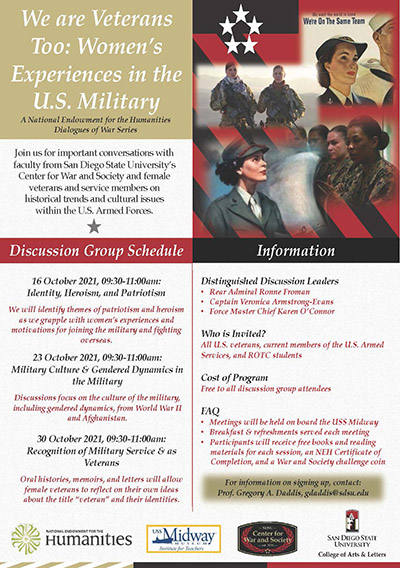
Reflecting on the Legacies of 9/11
Thursday, Sept. 9, 2021
4 p.m.
Via Zoom
Featured Panelists:
- Judge Najla Ayoubi, Chief of Coalition & Global Programs, Every Woman Treaty
- Maj (Ret) Danny Sjursen, Director, Eisenhower Media Network
- Bill Van Auken, Editorial Board, World Socialist Web Site
Moderated By:
- Professor Gregory Daddis, Department of History
- Professor Latha Varadarajan, Director, International Security and Conflict Resolution (ISCOR)
"Presented by ISCOR and the Department of History and co-sponsored by the College of Arts and Letters "
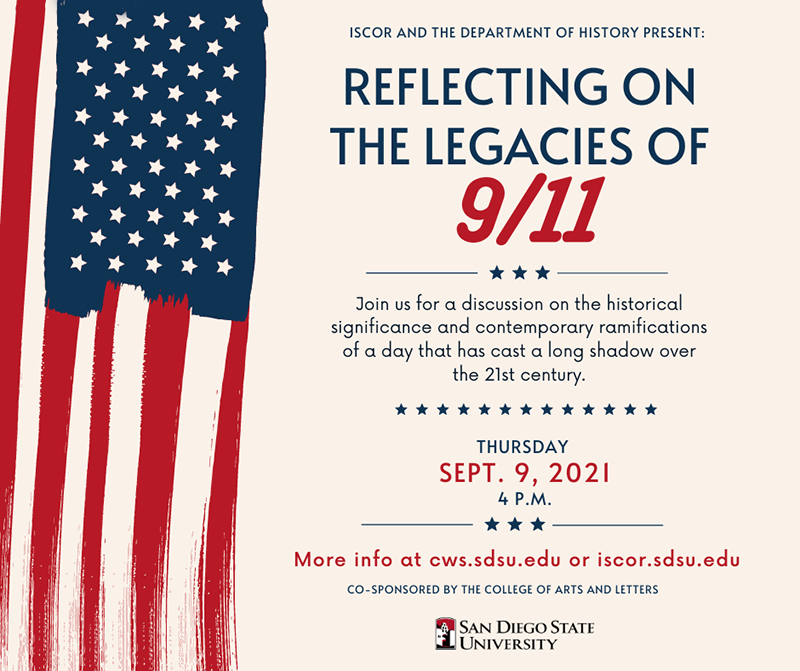
The Falls: Saigon & Kabul in Comparative Perspective
This roundtable discussion featuring three world-renowned experts will assess comparatively the end of America’s wars in Vietnam (1975) and Afghanistan (2021). It will also explore actual and potential global fallouts of the U.S. withdrawal from Afghanistan, including refugee crises, on the basis of past experiences in Vietnam and the rest of Indochina.
A Q&A session will follow the discussion.
All are welcome.
Thursday, Sept. 2, 2021
3:45-5 p.m.
SDSU Campus, West Commons 220
Featured Speakers
- Grace Cheng, Ph.D., Director of the Center for Human Rights, SDSU
- Gregory Daddis, Ph.D., USS Midway Chair in Modern U.S. Military History, SDSU
- Pierre Asselin, Ph.D., Dwight E. Stanford Chair in U.S. Foreign Relations, SDSU
For more information contact Professor Pierre Asselin at [email protected]. This event is jointly sponsored by SDSU’s Center for Human Rights, Center for War & Society, and Dwight E. Stanford Endowment.
SDSU’s Center for Military History [Renamed the Center for War and Society in October 2020] Welcomes New Director/USS Midway Chair in Modern U.S. Military History
June 25, 2020
Gregory Daddis joins the San Diego State University College of Arts and Letters history department this fall as the new director of the Center for Military History (CMH) and as the first USS Midway Chair in Modern U.S. Military History.
The appointment follows a nearly year-long, national search. In June 2019, during a joint news conference aboard the USS Midway, the USS Midway foundation announced a $3 million, five-year pledge to create and fund the endowed chair position in U.S. military history at SDSU.
With this appointment, SDSU is the only public university on the West Coast with an interdisciplinary program in modern U.S. military history.
“Military history literacy is vital to informed public discussions of international relations, diplomacy, foreign policies, and ultimately freedom in America and abroad,” said Mac McLaughlin, President and CEO of the USS Midway Museum. “This pioneering academic program will place service in uniform — and by extension service to community — in a context that educates and inspires future generations.
“Our foundation’s partnership with SDSU is one measure of the museum’s commitment to investing in education at every level,” he added.
Daddis will help leverage the shared vision of both SDSU and the USS Midway Museum by broadening the scope of important scholarly research, interdisciplinary teaching approaches, and impactful public engagement related to military history.
He aspires to help build an academic and professional forum for SDSU faculty and students, Southern California community leaders, and national policymakers to engage in vital questions on peace, conflict, and security.
Daddis, who grew up in New Jersey and later attended West Point, holds an M.A. in history from Villanova University and a Ph.D. in history from the University of North Carolina at Chapel Hill. He served as Chief of the American History Division in the Department of History at the U.S. Military Academy at West Point for five years, and his most recent post was at Chapman University, where he was the director of the nationally recognized War and Society graduate program.
Following graduation from West Point, Daddis was commissioned as an armor officer in the U.S. Army He served 26 years before retiring as a colonel. Daddis served in Operations Desert Storm and Iraqi Freedom, as well as in Korea, and in numerous posts across the United States.
“As a military historian, having served in uniform has challenged me to think about the possibilities and, more importantly, the limits of U.S. military power abroad,” Daddis said.
“For me, it’s important that we teach with an eye toward instilling practical knowledge
and skills in our students.”
Daddis specializes in the history of the Vietnam Wars and the Cold War era and has authored four books, including, most recently, "Withdrawal: Reassessing America’s Final Years in Vietnam "with Oxford University Press. He has also published several op-ed pieces on current military affairs in such publications as "The" "New York Times" "The Washington Post" the "Los Angeles Times" and "The" "National Interest" magazine. His latest book, scheduled for publication by Cambridge University Press in fall 2020, is titled "Pulp Vietnam: War and Gender in Cold War Men’s Adventure Magazines".
"Greg Daddis is a foremost international authority in the field of military history who has authored seminal works on the American war in Vietnam,” said Pierre Asselin, Professor and Dwight E. Stanford Chair in American Foreign Relations and current Center for Military History (CMH) Director. “Accomplished as he is, he remains incredibly nice and approachable. I've known him for quite some time and have always deeply respected him as a scholar and a human being. SDSU and our students in particular are really fortunate to have him join our ranks."
“San Diego has the largest military community in the free world, and Greg Daddis is a wonderful addition to the SDSU team doing research and teaching on military-related issues,” said Ed Beasley, Chair of the SDSU Department of History.
Daddis plans to demonstrate the strength of the humanities, so SDSU can become a national resource “that produces rational, intelligent advocates who help improve our national security strategy and larger foreign policy.” He said, “By studying the past, we’ll be better able to execute foreign policy in a holistic manner.”
“I want history to matter, not just for the past, but for the present and future,” said Daddis.
Read the SDSU NewsCenter story.
Fighting the Great War at Home: World War I and the Black Freedom Struggle
Monday, 18 November 2019, 5:00-6:45 pm in Hardy Tower 140
With Professor Adriane Lentz-Smith
Duke Univeristy History Department, and author of "Freedom Struggles: African Americans and WWI" will speak about the Buffalo Soldiers and other African American soldiers in WWI and how service at home and abroad contributed to the long black freedom struggle.
Public Lecture - The American Way of War: A Retrospective
Wednesday, 30 October 2019, 7:00-8:30 pm in AL-102
Brian Linn, Professor of History and Ralph R. Thomas Professor in Liberal Arts at Texas A&M University
For three decades the term “American Way of War” was largely restricted to academic discussion of Professor Russell F. Weigley’s 1973 history of military strategy. In the late 1990s it suddenly emerged as a catch-all phrase in the defense analysis community among those seeking to transform the nation’s military forces. Advocates claimed that new technologies and doctrines allowed a “New American Way of War” that would be rapid, decisive, and almost bloodless. This revolutionary ‘way’ of war would not only ensure U.S. military supremacy, but could spread American values and institutions across the globe. To some, the “New American Way of War” underlay the American military operations in Iraq and Afghanistan. The approaching half-century anniversary of the publication of The American Way of War provides an opportunity to reflect on its impact. Does Weigley’s thesis still provide a means to understand national military strategy? How did an academic’s thesis on national strategy become so politicized? Is there an American Way of War?
Brian McAllister Linn is the author of "Elvis’s Army: Cold War GI’s and the Atomic Battlefield" (Harvard, 2016); "The Echo of Battle: The Army’s Way of War" (Harvard, 2007); "The Philippine War, 1899-1902" (Kansas, 2000); "Guardians of Empire: The U.S. Army and the Pacific, 1902-1940" (North Carolina, 1997); and "The U.S. Army and Counterinsurgency in the Philippine War, 1899-1902" (North Carolina, 1989). He is the recipient of a John Simon Guggenheim Fellowship, a Woodrow Wilson Fellowship, and an Olin Fellowship at Yale University. He has been a visiting professor at the Army War College and a Fulbright Fellow at the National University of Singapore and the University of Birmingham. He is the past president of the Society for Military History.
"This talk is supported by SDSU’S Phi Alpha Theta Chapter & the Dwight Stanford Endowment. "
Free & open to all.
Contact Prof. Pierre Asselin at [email protected] for more information.
New Course for Fall 2019
A new, specialized course in the Military History of WWII in the Pacific, in partnership with the USS Midway Museum is being offered this fall. The course explores the motivations, events, and legacies of the wars in East Asia and the Pacific between 1937 and 1945. It examines the fears, ambitions, national policies, and the prosecution of war aims among the combatant nations. From how the Sino-Japanese conflict led to war with the United States, to the Pearl Harbor attack, Midway, and the struggle for the South Pacific, to the U.S. home front, the return to the Philippines, and how the war ended with the dawn of the atomic age. Assessment of military strategies and cultural perceptions highlight the choices made by not only the national leaders, but the young men and women who bore the brunt of the conflict that still defines relations in East Asia today.
USS Midway Foundation and SDSU Announce New Endowed Modern U.S. Military History Chair
San Diego State University will soon be the only public university on the West Coast with an interdisciplinary program in modern U.S. military history. Announced during a presentation aboard the USS Midway on Tuesday, June 11, the USS Midway Foundation has made a $3 million, five-year pledge to create and fund an endowed chair in modern U.S. military history at SDSU.
Midway’s board of directors unanimously approved its foundation gift during a meeting on Thursday, June 6, 2019. The USS Midway Chair gift is the single largest gift received by the university’s College of Arts and Letters. The endowed chair will sit in the college’s Department of History.
If you would like to learn more about this new endowed Chair or SDSU's Center for Military History, please contact Keely Bamberg, Sr. Director of Development, at [email protected].
Top image credit: "Patrol in the Jungle" Roger Blum. Courtesy of the US Army Museum
Enterprise art collection.
